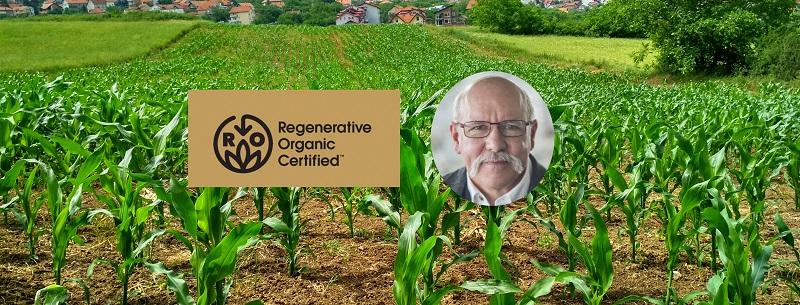Regenerative agriculture has gained a lot of attention since Robert Rodale coined the phrase fifty years ago. Many organizations use the word “regenerative” today, but the Rodale Institute and the Regenerative Organic Alliance (ROA) are creating a certification with USDA organic certification as its base.
Jeff Moyer, the Chief Executive Officer of Rodale Institute, sat down with OPN to discuss how the Regenerative Organic Certification (ROC) aims to set a higher-bar standard for organic agriculture and the progress they’ve made towards developing the standard.
 Jeff Moyer, CEO, Rodale Institute
Jeff Moyer, CEO, Rodale Institute
“We were concerned that a lot of organizations were using the word regenerative but didn’t incorporate organic principles – regenerative isn’t just a marketing term,” Moyer said. “We believe regenerative must be organic first as the jumping off point towards continuous improvement.
The ROC standard uses the USDA organic standards as a baseline requirement. It then adds important criteria and builds off these and other standards in the areas of soil health, land management, animal welfare, and farmer and worker fairness.
The Alliance, which also includes brands like Patagonia and Dr. Bronner’s, worked closely with the National Organic Program to make sure the new certification wasn’t seen as a loophole. They also worked with existing animal welfare social fairness programs to develop guidelines for each pillar.
“We understand that organic is the gold standard, but we just want to make sure that what we are doing takes things to the next level. We and our branded partners – Patagonia and Dr. Bronner’s - along with the government are all working together to raise the bar for organic,” Moyer said. “We want a standard that takes advantage of new science on soil health and creates continuous improvement in areas USDA doesn’t include. Could it be a pathway to improving the USDA regulations to someday include those important pillars-- Perhaps!”
Rodale, Regenerative Organic Alliance (ROA) and NSF International all worked together to create the new standard. In addition, 21 farms and companies across the globe participated in the ROC pilot program. Once the audits are complete, they will assess the findings to see if the standard needs changes.
NSF International will not be sole certifying agency. Moyer said, “We aren’t interested in changing the certifiers that farmers work with. Our idea is that existing accredited organic certifiers will be our service providers. They be accredited through ROA and then NSF will be the internal audit control body. ROC will be an additional service that organic certifiers can provide so farmers can be certified under both during the same audit.

ROC focuses on soil health, animal welfare and social fairness
The ROC program was slated to launch last month at Natural Products Expo West, with ROC product on the shelves by the end of 2020, Moyer said.
Whole Foods Market thinks Regenerative Organic Certification will be the biggest food trend to watch in 2020.
“ROC is the pathway to giving consumers what they want. They have told us that when they pick up an organic product, it says nothing about fair trade practices or animal welfare. Since these are all values that are important to them - why should they have to choose? ROC represents a product that embodies the entire suite of values they think are important," Moyer said.
ROC intends to recognize those farmers that have gone to the next level and are incorporating soil health, animal welfare and social fairness programs into USDA organic. “There is no place in the marketplace to reward those farmers who are going above and beyond.” Moyer said. “Our logo will ensure that labor is treated right, the soil is healthy, and the animals are treated humanely. We believe regenerative organic is the future and are pleased and honored to be at the forefront.”

